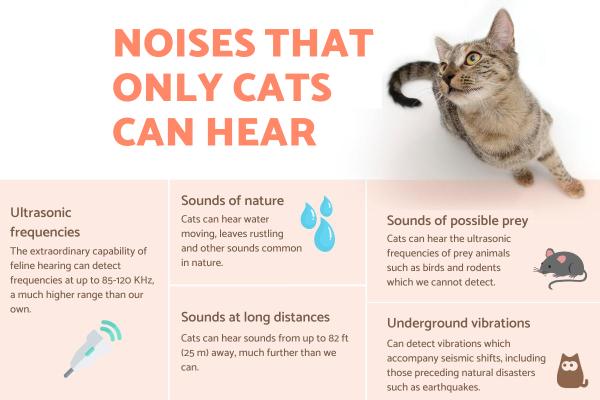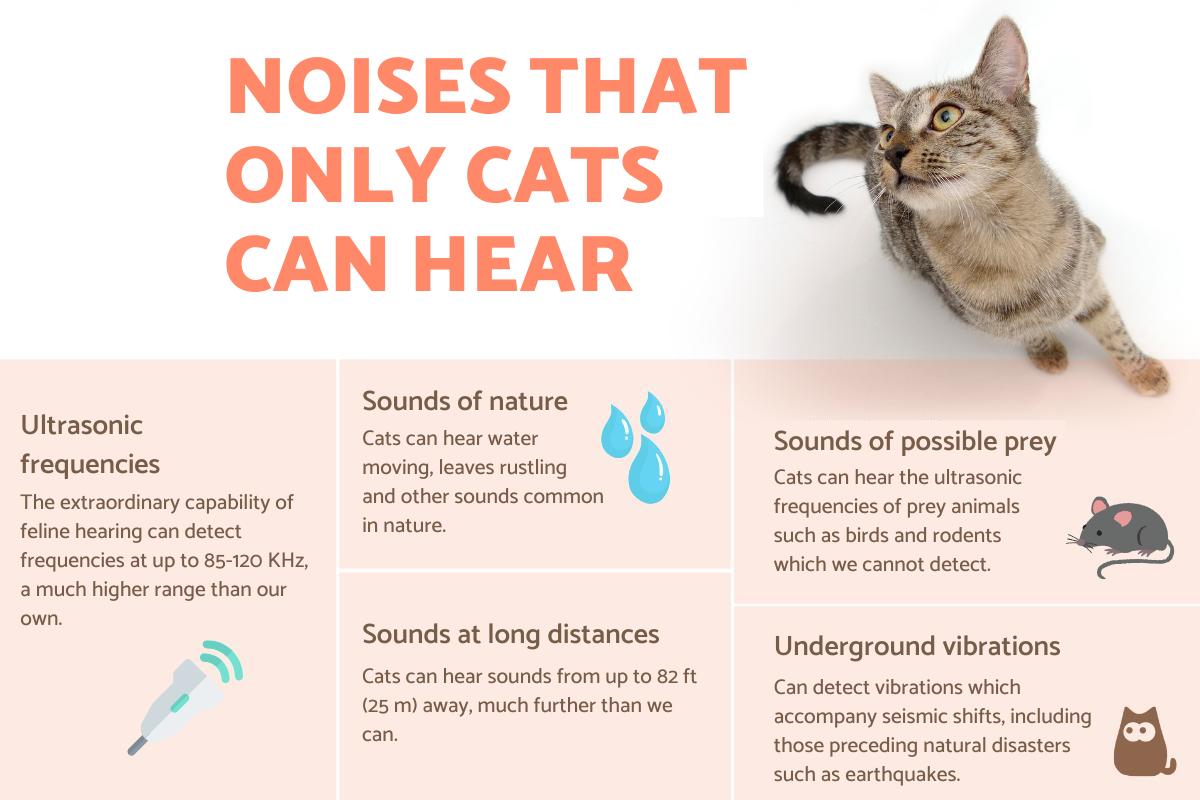Noises That Only Cats Can Hear



See files for Cats
A cat's sense of hearing is much more acute than our own, an evolutionary trait which has allowed them to continue to be the incredible hunters they are. There are important reasons for this. Humans have adapted to rely more on social communication and agriculture to meet our survivals needs. Since cats are not known for their farming ability, their evolutionary adaptation means they rely more on senses such as hearing. We can see this in the fact they can hear a much wider range of sound frequencies and volumes.
Thanks to such acute hearing, there are various noises only cats can hear. This is why we provide a list of different noises we cannot detect, meaning only cats can hear these sounds.
Ultrasonic frequencies
Humans are able to perceive frequencies up to about 16 to 20 KHz. This is very little compared to the extraordinary hearing of cats which can pick up frequencies up to 85 KHz to 100 KHz. In practice, this means cats hear much higher pitched noises than we are able to hear. Ultrasonic frequencies are a clear example of this, since they go completely undetected by the human ear. Only cats can hear these sounds or other animals with better hearing than our own.
Several companies have used this fact about cat hearing to produce ultrasonic cat repellent devices. They operate by emitting ultrasonic frequencies which deter cats from a property, but which are unable to be registered by human hearing. While they may be effective for deterring cats, these frequencies can harm other pets in the neighborhood or even local wildlife. You can find some better solutions with our article on how to keep cats off your property.
Sounds at long distances
It is common to see our cat tilting their head toward or becoming hyper focused on seemingly nothing. This has led to some guardians wondering if their cat has some extrasensory ability. Far from supernatural senses, cats are simply more attuned to sounds in our environment than we are.
Such sounds don't need to be in their immediate environs. Cats are attentive to sounds which can be much further away than we are able to perceive. While cats are able to hear at higher frequencies, they are also able to hear at longer distances. Cats are believed to be able to perceive stimuli that occur up to 82 ft (25 m) away, although this will vary according to factors such as volume and pitch.
This ability to hear at distances is also the reason why your cat knows when you are about to arrive home long before you even approach the door. Their extraordinary senses allow them to recognize you car, voice, key jangle or other indicative noises from many feet away. They can also detect you from afar thanks to their acute sense of smell.
A wide range of hearing makes our cats much more sensitive than we are to loud and/or sudden noises. Fireworks, thunder, traffic and general noise pollution can be very bothersome to cats. Due to their sensitive hearing, they can elicit fear as they can't actually see the stimulus. This can lead to them believing an unknown threat is imminent.
In addition to fireworks and traffic, learn about the other sounds cats hate in our related guide.
Noises of possible prey
It is not only technological devices which emit high or ultrasonic frequencies. Various animals can also do so, either as part of their communication or as a result of their interaction with an environment. As with the previous entries on our list, these are noises that only cats can hear, but which we cannot.
For example, mice and other small rodents emit a constant noise that is similar to a very weak squeak. Although inaudible to humans, it is easily picked up by cats. Something very similar happens with birds, which are the most attractive prey for domestic felines.
Despite having lived alongside humans for centuries, cats retain excellent hunting skills. This drives much of their instinctive behaviors. The extraordinary hearing range is a very powerful tool for hunting, allowing cats to know the location of their prey and track their movements. This enables them to carry out a more precise attack. For this reason, the noises emitted naturally by potential prey are among the sounds that attract cats the most.

Sounds of nature
Beyond the movements of their prey, many sounds that only cats hear are those produced by nature. For example, cats can hear the leaves of trees moving in the wind, raindrops falling on grass, bodies of water moving along their course, the humming sound produced by the friction of insect wings, the tiny footsteps of ants bringing food to their colony and the noises produced by bird or bat wings flapping, among many others.
This is similar to dogs, which also have acute hearing. While canine hearing is extremely well developed, cats have a greater hearing range. They are able to record higher frequencies and those further away from their location. In addition, cat ears are made up of around 32 muscles, while while those of dogs only have 17. This gives cats greater directional hearing, moving their ears to better tune into a noise. Humans have fixed ears, reducing their hearing ability further.
A cat's morphology can affect their directional hearing. For this reason, large-eared cat breeds tend to have better hearing ability than cats with floppy ears.
Underground vibrations
There is a popular belief that animals are capable of predicting major storms, earthquakes and other catastrophic events. Although this predictive ability is not scientifically proven, we know that cats and many other species can detect high-frequency vibrations or other sounds coming from the ground. This means they are able to detect noises that are directly associated with the seismic movements and atmospheric changes of adverse weather events.
Since cats and other animals with extremely sensitive hearing are able to hear these sounds, it allows them to anticipate the occurrence of natural disasters such as earthquakes, hurricanes or tsunamis before their effects are perceptible to the human population. If you want to learn more about this great perceptive ability, take a look at our article providing 7 things cats can predict.

Heart and lung rate
Heartbeats are an acoustic phenomenon that results from the opening and closing of the heart valves. The human ear is not able to detect this sound without the help of amplifying devices such as when doctors use a stethoscope to perform auscultation. They do so to hear heartbeat and lung respiration as a means to detect any potential abnormality.
The powerful ears of cats are perfectly capable of registering the sounds of heart and lung function. As a result, your cat can easily and quickly perceive the acceleration of your heart rate and the rhythm of your breathing. This can alert them to changes in your emotional state, such as when you are stressed, angry or fearful for any reason.
In addition, a cat's keen sense of smell can detect the hormonal and physiological changes that occur in the human body when we are affected by negative emotions. Feline sensory abilities also play a key role in communication and interaction with humans. The way they behave in the presence of a person will naturally be influenced by the mood and body language they perceive in them.
If you would like to learn more about this topic, don't miss our related article which explains how cats see humans.

If you want to read similar articles to Noises That Only Cats Can Hear, we recommend you visit our Facts about the animal kingdom category.







